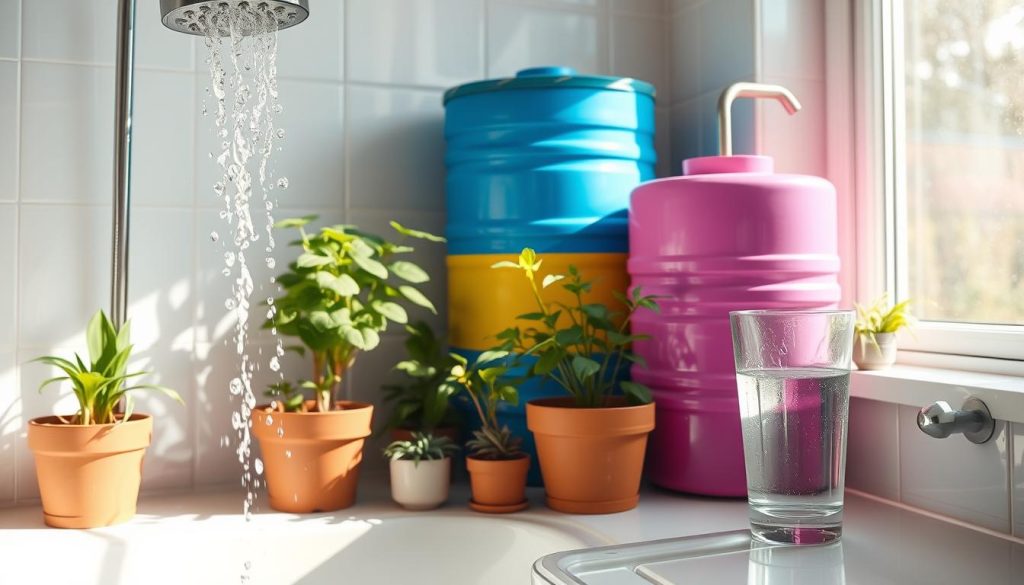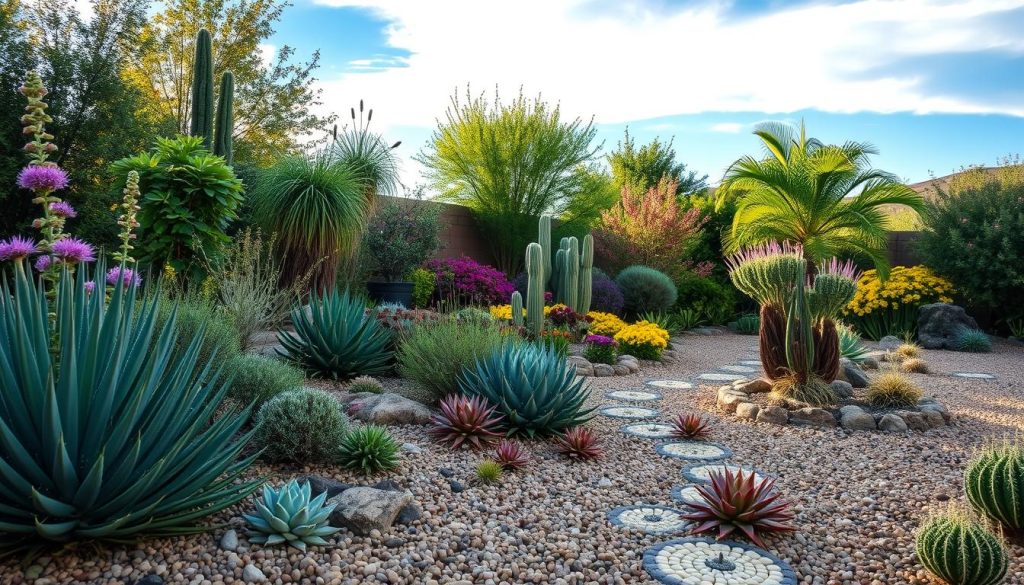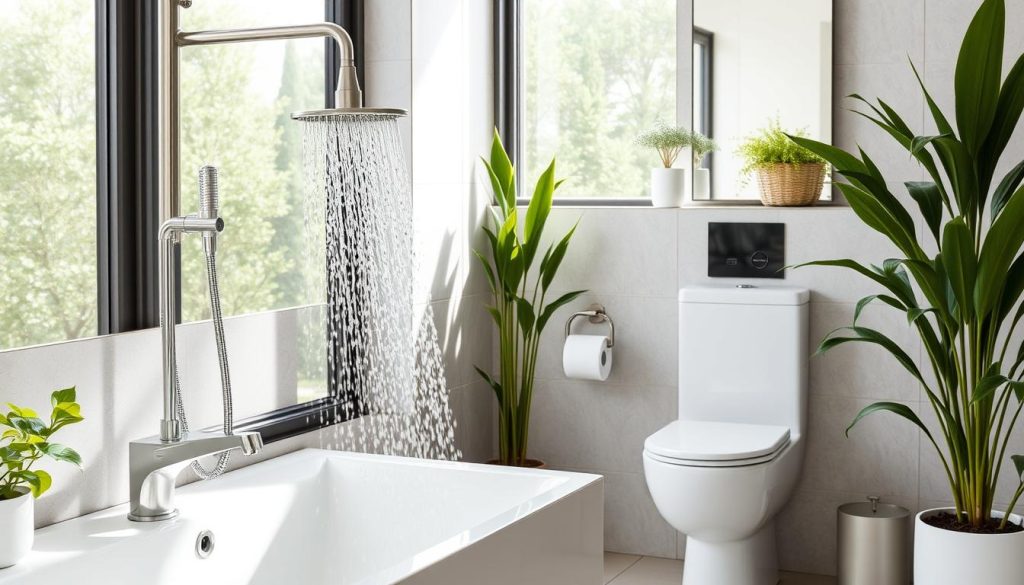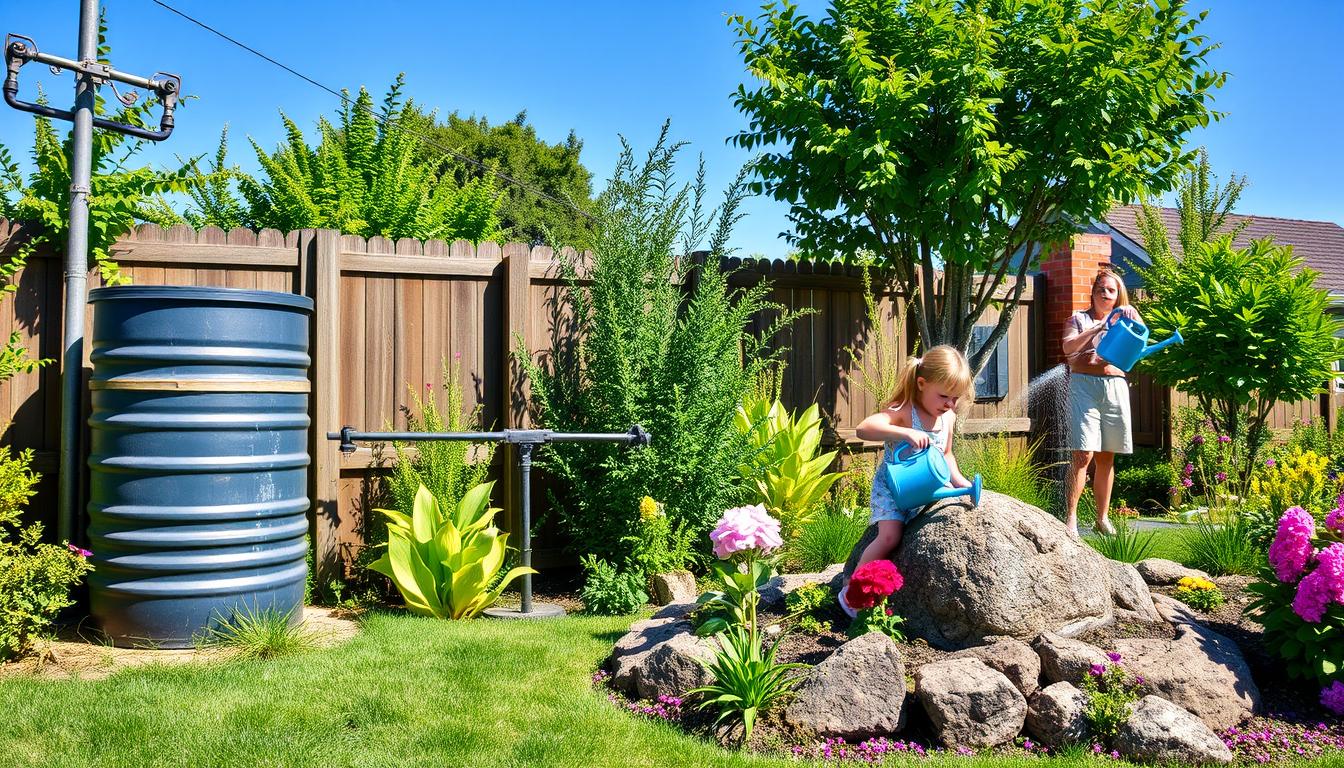As a responsible citizen, I know how vital water conservation is. Water is a precious and limited resource. It’s our duty to use it wisely. In this article, I’ll share key tips to help us save water in our daily lives and protect the environment.
Water conservation is more than just a trend; it’s essential. By using simple yet effective methods, we can cut down our water use. This not only saves money on bills but also helps our planet. We can make a big difference by changing our habits and choosing water-saving appliances.
In the next parts, I’ll talk about the good things water conservation does for our planet and wallets. I’ll give you practical advice on saving water at home and in our gardens. I’ll also show you creative ways to use and reuse water. Plus, I’ll share how communities are working together and why it’s important to stay updated on water-saving ideas.
Understanding the Importance of Water Conservation
Water conservation is something I deeply care about. Water is a limited resource, and how we use it affects our planet and communities.
Why Saving Water Matters to Me
I grew up in a drought-prone area. I saw how water scarcity hurts our ecosystem and daily life. This made me want to save water and encourage others to do the same.
Environmental Impact of Water Waste
- Using too much water harms our freshwater sources and ecosystems.
- Water waste damages natural landscapes and reduces biodiversity.
- It can also disrupt food production and force communities to move.
Economic Benefits of Conserving Water
Water-saving can also save money. Lowering our water use cuts utility bills. This helps our water systems and saves taxpayers money.
As our climate changes and water becomes scarcer, we must act. By saving water, we protect our environment and ensure a better future for all.
Simple Daily Habits to Reduce Water Usage

Reducing water waste starts with small, everyday actions. Making a few changes in our daily routines can save a lot of water. Here are some tips that have helped me.
Shorter Showers: A Personal Challenge
One easy way to save water is by taking shorter showers. I challenge myself to shower for 5-7 minutes. This simple change has greatly reduced my household’s water use without hurting my cleanliness.
Fixing Dripping Faucets
Leaky faucets waste a lot of water, so it’s important to fix them fast. I check for drips often and fix them right away. Fixing a leaky faucet may seem small, but it saves a lot of water each year.
Turning Off the Tap While Brushing
Another habit I’ve adopted is turning off the tap while brushing my teeth. It’s easy to let the water run while we’re distracted. But turning off the tap and only rinsing when needed saves a lot of water. This has become a natural part of my routine.
By following these simple habits, I’ve made a big difference in my water use. Every small action helps, and these steps can lead to big water savings over time.
Efficient Watering Techniques for My Garden

As a passionate gardener, I’ve learned that saving water is key for a lush garden. One top tip is to water at the best times. This way, I use less water and keep my garden healthy and green.
Best Times to Water Plants
Watering between 6 and 9 AM is perfect for my garden. The sun is low, so water goes deep into the soil. This avoids wasting water and helps plants grow strong.
Using a Drip Irrigation System
I’ve also started using a drip irrigation system. It waters plants right at their roots, saving water. This method is great for using water wisely in my garden.
Mulching to Retain Moisture
Mulching is another trick I’ve learned. It keeps the soil moist with a layer of organic material. This simple step helps a lot with xeriscaping and saving water.
These sustainable water usage tips have cut down my water use. My garden stays beautiful and healthy, and it’s good for the planet too.
Choosing Water-Efficient Appliances

Buying water-efficient appliances is a smart move. It cuts down on water use and lowers bills. I’ve seen how new, water-saving fixtures can really help.
My Experience with Low-Flow Toilets
I replaced my old toilet with a low-flow one. It uses much less water per flush. This saves me hundreds of gallons a month. The change was easy, and it’s been worth it.
Energy Star Rated Dishwashers
I picked an Energy Star dishwasher for my kitchen. These dishwashers use less water and energy. My water bills have gone down since I got it.
Benefits of Water-Saving Showerheads
- Low-flow showerheads cut water use by up to 50% without losing quality.
- They’re simple to install and are available at most stores.
- Switching to a water-efficient showerhead is a quick way to save water at home.
Using these water-efficient appliances has really helped. My water use and bills have dropped. It’s good for my home and the planet.
Creative Ways to Collect and Reuse Water
I’ve found new ways to collect and reuse water at home. I use rainwater harvesting and greywater systems. These methods help me save water and support sustainable use.
Rainwater Harvesting Setup at Home
Setting up a rainwater harvesting system was a rewarding project. I installed gutters, downspouts, and a tank. Now, I use rainwater for my garden, washing my car, and even flushing toilets. It saves me money and helps the environment.
Greywater Systems: What I Learned
I also learned about greywater systems. Greywater is clean wastewater from sinks, showers, and washing machines. I use it for irrigation and other non-drinking uses. A simple system lets me reuse this water in my garden.
Practical Uses for Collected Water
- Watering my vegetable garden and flower beds
- Washing my car and outdoor surfaces
- Flushing my toilets, reducing the demand for potable water
- Refilling my pond or water feature
- Topping up my washing machine when needed
Rainwater harvesting and greywater systems have cut my water use. They help manage water better in my community. These techniques have made a big difference in my home’s environmental impact.
Community Efforts for Water Conservation
As someone who cares about water, I’ve joined local water conservation programs. These efforts help us all save water and prepare for droughts. They teach us how to use water wisely.
Joining Local Water Conservation Programs
My town has many water-saving programs. They help me save water at home. I get rebates for water-efficient appliances and free audits to check my water use.
Participating in Clean-Up Drives
- I help clean up waterways and beaches. It keeps our water clean and teaches us to care for it.
- At these events, I meet others and share my water-saving tips. It encourages them to save water too.
Sharing My Tips with Friends and Family
I share my water-saving tips with everyone I know. It’s a great way to spread the word and inspire others to save water.
These community efforts have taught me a lot about saving water. Together, we can make a big difference. We can create a more sustainable future and deal with water scarcity.
Staying Informed on Water Conservation Strategies
I’m always looking for new ways to save water. It’s important to know the latest in water saving. I follow blogs, websites, and educational resources to stay informed.
Following Useful Blogs and Websites
The Environmental Protection Agency’s WaterSense program and the Alliance for Water Efficiency are great resources. Blogs like “The Water Blog” and “H2Oconserve” also offer useful tips. By subscribing, I keep up with the latest water conservation news.
Attending Workshops and Seminars
I also attend local workshops and seminars on water conservation. These events let me learn from experts and meet others who care about water. I’ve learned a lot and been inspired to take action.
Books That Inspired My Water Conservation Journey
Several books have inspired me to conserve water. “The Water-Wise Home” by Laura Allen and “Liquid Gold” by Andrew Bibby are two that stand out. They’ve helped shape my approach to water conservation.

